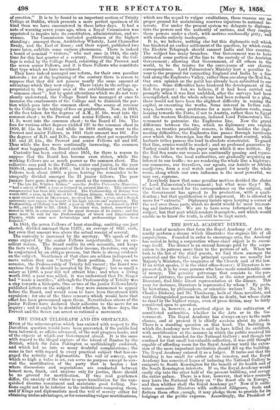THE INDIAN TELEGRAPH AND ITS OBSTACLES. Mr= of the misconception
which has existed with respect to the Danubian question would have been prevented, if the public had been informed, as affairs advanced, of the real progress made, and of the objects at which our Government aimed. It is the same with regard to the illegal capture of the island of Ruatan by the British, which Sir John Pakington so unthinkingly endorsed, and which led us into so many doubtful complications ; the same in fact with regard to every practical subject that has en- gaged the activity of diplomatists. The veil of secrecy, upon which so high a value is set, can serve no purpose except to con- ceal the mortification of the party that is beaten ; but where discussions and negociations are conducted between honest men, frank, and anxious only for justice, there should be no ground for mortification. If two real gentlemen differ, the anxiety of the victor to spare humiliation for the van- quished disarms resentment and maintains good feeling. Na- tions ought not to be inferior to the individuals composing them, and if Kings and diplomatists need the veil of secrecy either for obtaining undue advantages, or for concealing vulgar mortifications,
which are the sequel to vulgar exultations, those reasons are no proper ground for maintaining reserves injurious to national in- terests. For under the present system we delegate to diploma- tists the powers and the authority of nations, and they employ those powers under a cloak, with motives confessedly petty, an with results entirely inadequate.
It is, we believe, nothing else but this diplomatic Veil which has hindered an earlier settlement of the question, by which route the Electric Telegraph should connect India and this country. The subject has many branches. Our Government was to have intrusted some portion of the line to the custody of the Austrian Government; allowing that Government, of all others in the world, to be the trustee for the conveyance of our electric correspondence. Lord Palmerston's Ministry lent a peculiar fa- vour to the proposal for connecting England and India by a line laid along the Euphrates Valley, rather than one along the Red Sea. Our own opinion on the point has already been submitted to our readers. Some difficulties have hindered the development of the Red Sea project ; but, we believe, if it had been carried out promptly when it was first unfolded, after the surveys had been accomplished, and the whole scheme had been reduced to a plan, there would not have been the slightest difficulty. in raising the capital, or executing the works. Sonic interest terest in Indian rail- ways, however' some preference for a more Eastern route, some leaning towards the Porte, if not to Austria rather than to Egypt and the western Mediterranean, induced Lord Palmerston's Go- vernment to patronize the Euphrates line. Now the grand difference between the two, which no diplomacy can explain away, no treaties practically remove, is that, besides the engi- neering difficulties' the Euphrates line passes through territories over which the Sovereign has the most imperfect control, while barbaric tribes possess the land in absolute unrestraint. To guard that line, armies would be needed ; and no professed guarantee by Turkey could be worth the paper upon which it was written. By the Red Sea route our vessels are continually passing and repass- ing ; the tribes, the local authorities, are gradually acquiring an interest in our traffic ; we are rendering the whole line a highway; our commerce, our travellers our agents, our Asiatic or African coadjutors, form a real watch and guard for nearly the whole route, along which our own influence is the most powerful, we may say, supreme. Everybody knew that some peculiar motives decided the choice of Lord Palmerston's Government; but what were they ? Mr. Crawford has moved for the correspondence on the subject, and the Government has agreed to its production with a quali- fication; but that qualification is all important. He is allowed to move for "extracts." Diplomacy insists upon keeping a corner of the veil over those parts which no doubt would be most interest- ing and instructive. We are to have some information on the subject, but that part which renders it complete, and which would enable us to know the truth, is still to be kept secret.


























 Previous page
Previous page